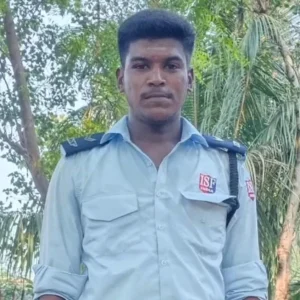Tamil Nadu – The Tamil Nadu custodial death case involving 29-year-old temple security guard Ajith Kumar has taken a dramatic turn following the release of autopsy results that revealed multiple severe injuries. Five policemen who were initially suspended over the Tamil Nadu custodial death have now been arrested after authorities received the post-mortem report late Monday night, confirming that Kumar had suffered significant trauma to his head and chest while in police custody.
The incident, which occurred in Sivaganga district on June 29, has once again brought the spotlight on custodial violence in the state. This particular Tamil Nadu custodial death has prompted immediate action from state authorities, with the case now being classified as murder based on the damning autopsy findings.
Autopsy Results Confirm Brutality in Tamil Nadu Custodial Death

According to a police officer who spoke on condition of anonymity, the post-mortem examination was videographed in accordance with Madras High Court directions for cases involving custodial deaths. The autopsy revealed contusions on Kumar’s head and chest, providing concrete evidence of the violence that led to this tragic Tamil Nadu custodial death.
The videographed post-mortem serves as crucial evidence in building the murder case against the accused officers. The detailed documentation ensures transparency in the investigation process and provides irrefutable proof of the injuries sustained by Kumar during his time in police custody.
Timeline of Events Leading to Tamil Nadu Custodial Death
The sequence of events that led to this Tamil Nadu custodial death began on June 27 when police picked up Ajith Kumar for questioning. The interrogation was prompted by a complaint filed by a woman who alleged that her gold jewelry, which was kept in a bag, went missing after she had given her keys to Kumar to park her car near the Madapuram Bhadrakali Amman temple.
Kumar’s brother has made serious allegations regarding the treatment they received while in custody, claiming that police officers physically assaulted them after taking them into custody. These allegations have now been substantiated by the autopsy results in this Tamil Nadu custodial death case.
Also Read: Big Revelations By Kharge on Karnataka CM Change; Hints On High Command Decision
The situation deteriorated rapidly, and Kumar was declared dead after being taken to a hospital on June 29, following complaints of discomfort. What began as a routine questioning session had escalated into a fatal encounter, marking another tragic Tamil Nadu custodial death under the current administration.
Administrative Actions Following Tamil Nadu Custodial Death
In response to this Tamil Nadu custodial death, significant administrative changes have been implemented. Sivaganga police superintendent Ashish Rawat has been placed on compulsory wait, effectively removing him from his position. His Ramanathapuram counterpart, G Chandeesh, has been appointed to replace him, signaling the seriousness with which authorities are treating this case.

Six policemen were initially suspended over the Tamil Nadu custodial death, with five of them now facing arrest following the autopsy results. This swift action demonstrates the state government’s commitment to addressing custodial violence, though critics argue that such measures should be preventive rather than reactive.
Government Response and Judicial Inquiry
The state government has ordered a comprehensive judicial inquiry into this Tamil Nadu custodial death, acknowledging the gravity of the situation. This inquiry will examine not only the immediate circumstances leading to Kumar’s death but also the broader systemic issues that enable such incidents to occur.
The decision to classify the case as murder based on the post-mortem report represents a significant step in ensuring accountability for this Tamil Nadu custodial death. It sends a clear message that custodial violence will not be tolerated and that those responsible will face the full force of the law.
Political Ramifications of Tamil Nadu Custodial Death
The opposition parties have seized upon this Tamil Nadu custodial death to launch scathing attacks on the ruling Dravida Munnetra Kazhagam (DMK) government. They have highlighted that this incident represents the 24th death in police custody since the DMK formed the government in 2021, raising serious questions about the administration’s ability to control police excesses.
The All India Anna Dravida Munnetra Kazhagam (AIADMK) has taken the matter to the Madras High Court, urging judicial intervention regarding the custodial deaths under DMK rule. This legal challenge adds another dimension to the political fallout from this Tamil Nadu custodial death.
AIADMK general secretary Edappadi Palaniswami has been particularly critical, targeting Chief Minister MK Stalin directly. He argued that Stalin cannot effectively manage the police force that functions under his direct control, using this Tamil Nadu custodial death as evidence of administrative failure.
Opposition Demands and Criticism
Palaniswami has demanded immediate action, calling for the formation of a committee headed by the district judge to conduct a comprehensive investigation into this Tamil Nadu custodial death. He has also insisted on legal action against all those responsible and adequate compensation for Kumar’s family.
The opposition’s criticism extends beyond this single incident, with leaders characterizing this Tamil Nadu custodial death as symptomatic of broader governance failures under the current administration. They argue that the frequency of such incidents indicates a systemic problem that requires urgent attention.
Chief Minister’s Response


In response to the controversy surrounding this Tamil Nadu custodial death, Chief Minister MK Stalin has issued directives to the police force. He has emphasized the importance of treating people who come to file complaints with dignity and ensuring timely action on their concerns.
However, even DMK’s political allies have urged the government to conduct an independent inquiry into this Tamil Nadu custodial death, suggesting that the incident has caused concern across the political spectrum.
Closing Statements
This Tamil Nadu custodial death serves as a stark reminder of the urgent need for police reforms and accountability mechanisms. While the swift arrests and administrative actions are positive steps, they highlight the reactive nature of current responses to custodial violence. The judicial inquiry and subsequent legal proceedings will be crucial in determining whether this tragic incident leads to meaningful systemic changes in how police custody cases are handled in the state.

